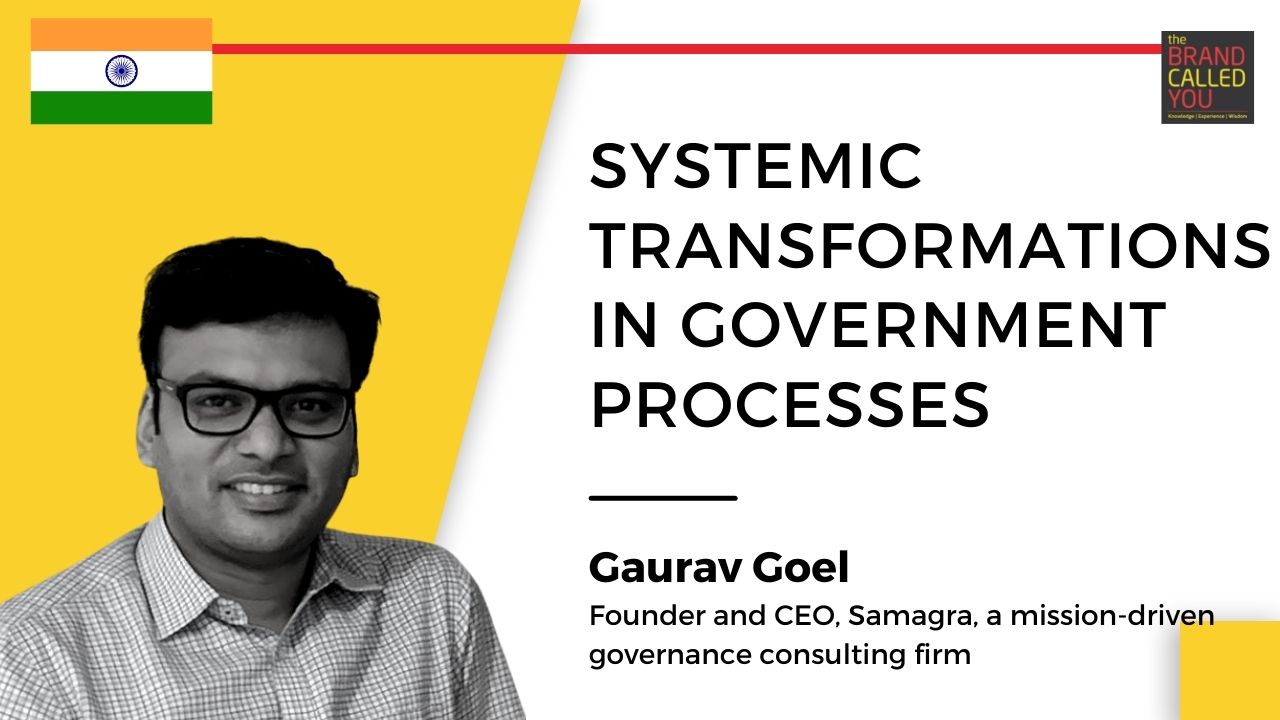Gaurav Goel, Founder, and CEO, Samagra, a mission-driven governance consulting firm
Gaurav is the Founder & CEO of Samagra, a mission-driven governance consulting firm. Gaurav holds a dual degree in Computer Science & Engineering from IIT Delhi and an MBA from IIM Calcutta.
Podcast
Overview
The government makes schemes and brings different projects for the betterment of society. But a good plan is of no use if its execution is unsatisfactory. Whenever we think of opting for a government service, the preconceived notion is that it would be very slow and would take a lot of time and visits for the job to be done. One also has to bribe at different levels to get the service. To eliminate this unsatisfactory practice and bring systemic changes to the government system, our guest for today, Gaurav Goel, took a step.
Gaurav Goel and Samagra
Gaurav is the Founder and CEO of Samagra, which is a mission-driven consulting firm. Gaurav tells us that the core thesis of Samagra is better governance as a lever to create large scale impact, fundamentally believing that while a lot of things can be done outside of the system, if one wants to touch millions, especially the underprivileged, and transform their lives, one has to work with the political and government processes. Samagra was founded about nine years ago and since then it has been working with different state governments to improve the system processes. They work with the bureaucratic leadership of a state with a mandate at a political executive level on system transformation at different domains like education, healthcare, scheme delivery, agriculture, skilling, etc.
Systemic Transformation
Gaurav explains systemic transformation as taking a system’s thinking approach to take a particular domain in a state from Point A to Point B. Gaurav adds that it is not a point intervention, instead, it is a combination of interventions that will make the change happen.
Systemic change in states
Gaurav tells us that Samagra worked in Haryana, for a period of around three years, on overhauling the way the government to citizens schemes and services like driving license, income certificate, caste certificate, old age pension, etc. getting delivered. Samagra made sure that the schemes and services must be delivered in a seamless and convenient manner. They coordinated with all the 35 ministries and departments. Gaurav tells us that there are more than 550 schemes cutting across the 35 ministries and departments, which they anchored in a single technology platform, streamlining the way citizens apply to those. Citizens could apply either online or in the designated centers that the government created for these activities called the ‘Saral Kendras’. This facilitates seamless processing of the applications and services getting delivered in the right time.
Governance Challenges
Gaurav says that one of the biggest challenges in government systems is performance management. In the corporate sector, the performance is managed by hiring people, firing people, giving them incentives, etc. but one cannot do this in government offices to drive performance. According to Gaurav, one has to give nonfinancial attractions to the government employees to manage performance and thus it becomes more complex for the change management there. Since performance is not well managed, it gets tricky for the system to move fast.
Gaurav also considers the quality of people getting into the bureaucracy as a challenge. Another challenge he talks about is the legacy in the government systems. He says that if you want to create something new, you can do it easily, but if you wish to change something that is already existing, it is quite challenging.
Building Govtech products
Discussing the GovTech products, Gaurav tells us that while he was working on the systemic changes with the government, he realized that anything that has to be done on that scale, has to be enabled by technology that wasn’t at its best position there. The lack of technology was used to hold back the reform. Five years ago, Gaurav decided to improve the technological capabilities so that it could complement the ability the government has. That is how GovTech technology came into existence.
How are millennials driving change in government organizations?
Gaurav tells us that he is amazed by how the millennials in the bureaucratic sector work. He believes that the millennials he works with are very talented, professional, and are committed to their work. He also tells us that he is quite optimistic about the potential of the millennial generation. According to him, the millennials are very purpose-driven and look for meaning in their professional life. However, from a political perspective, he says that millennials are yet to get prominent and he believes that it would happen soon.
Profile
Gaurav is the Founder & CEO of Samagra, a mission-driven governance consulting firm. Gaurav holds a dual degree in Computer Science & Engineering from IIT Delhi and an MBA from IIM Calcutta. After graduating from IIM Calcutta, he joined McKinsey & Co. as a Management Consultant where he worked across sectors and geographies, solving diverse corporate problem statements. While he was enjoying his stint at McKinsey, he knew that eventually he wanted to work towards improving the lives of citizens by engaging with the governance process. In 2012, he set up Samagra so that he could translate his passion into reality and create impact at scale.
Samagra is a mission-driven governance consulting firm working with the bureaucratic leadership of states and the Centre to solve complex governance problems. Founded in 2012, Samagra has been working across domains such as agriculture, education, employment, health, public service delivery and skilling among others, to impact the lives of Indian citizens. Under its SamagraX vertical, the firm is also pioneering the use of OpenSource to build GovTech products and platforms and contributing to national digital public goods. With a dynamic team of committed professionals, Samagra is a uniquely Indian story of entrepreneurship aimed at creating impact at scale.


